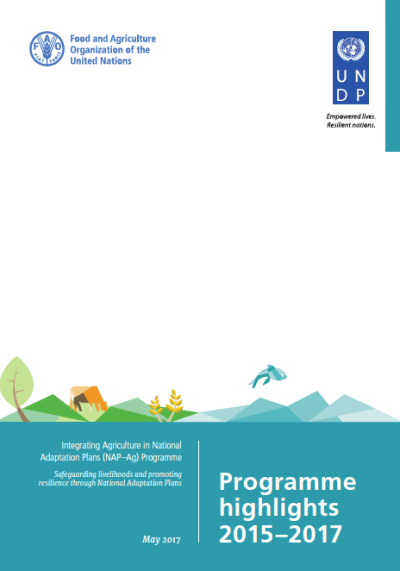
The joint United Nations Development Programme (UNDP) and Food and Agriculture Organization of the United Nations (FAO) Integrating Agriculture in National Adaptation Plans – Programme (NAP– Ag) is a multi–year initiative (2015–2018) funded by the International Climate Initiative of the German Federal Ministry for the Environment, Nature Conservation, Building and Nuclear Safety (BMUB). The NAP–Ag Programme is supporting countries in Africa, Asia and Latin America to identify and integrate climate change adaptation measures into relevant national planning and budgeting processes. This integration will help enhance institutional capacities and processes for operationalization of climate response strategies in the agriculture sectors as well as the facilitation of stronger partnerships between ministries of agriculture, environment, planning and finance, and other national partners. NAP–Ag provides support to countries for accessing climate finance through international mechanisms, such as the Green Climate Fund (GCF), bilateral and multilateral funding mechanisms, as well as national financing. The Programme contributes to NAPs and the achievement of targets laid out in partner countries’ Nationally Determined Contributions (NDC) and the Sustainable Development Goals (SDG), in particular SDG–2 “Zero Hunger” and SDG –13 “Climate Action” , by strengthening resilience and adaptive capacity to climate–related hazards and natural disasters.
Five key achievements at a glance
1. Advanced the development of climate change adaptation planning strategies and frameworks in the agriculture sectors in Kenya, Philippines, Thailand and Uganda
2. Enhanced capacities of agriculture sector's decision-makers to appraise adaptation options, using cost-benefit analysis and impact evaluation, as a means to advance the NAP processes in Uganda, Uruguay and Zambia
3. Initiated the leveraging of climate finance for the implementation of climate change adaptation strategies and frameworks in the agriculture sectors in Nepal, Thailand and Viet Nam
4. Boosted capacity for gender mainstreaming through: technical training; incorporation of sex-disaggregated data and gender analysis into cost-benefit analyses and impact evaluations; and development of a tool to increase women’s incomes in the agriculture sector's value chains
5. Catalysed global attention to the integration of agriculture into NAPs through engagement of NAP-Ag country representatives in: Least Developed Country Expert Group (LEG) training workshops and meetings; side events at COP 21 and COP 22; Adaptation Committee meetings; and NAP Expos
